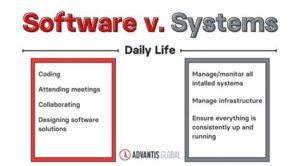Explore the essential skills, challenges, and career growth opportunities for Senior Systems Engineers, and understand their pivotal role in project success.In today’s rapidly evolving technological landscape, the role of a Senior Systems Engineer (Sr Systems Engineer) is more critical than ever. As organizations increasingly rely on complex systems to drive efficiency and innovation, understanding the nuances of this position becomes essential. A Sr Systems Engineer not only designs and integrates sophisticated systems but also navigates challenges to ensure project success. This article delves into the multifaceted world of Sr Systems Engineering, exploring the essential skills required, common obstacles faced, and the significant impact these professionals have on overall project outcomes. Additionally, we will highlight the promising career growth opportunities available in this dynamic field. Whether you’re an aspiring engineer or an organization seeking to enhance your team, this guide will provide valuable insights into elevating your understanding of Sr Systems Engineering.
Understanding The Role Of An Sr Systems Engineer
An sr systems engineer plays a critical role in the design, integration, and management of complex systems within an organization. These professionals are responsible for ensuring that various system components work together seamlessly to meet project requirements and deliver optimal performance.
One of the primary responsibilities of an sr systems engineer is to collaborate with cross-functional teams, including software developers, hardware engineers, and project managers, to define system specifications and requirements. This collaboration ensures that each element of the project aligns with the overarching goals.
In addition to requirement gathering, sr systems engineers are tasked with conducting risk assessments and feasibility studies. They analyze potential risks associated with system designs and recommend alternatives to enhance system resilience and reliability. This proactive approach is essential for mitigating issues that can arise during the project lifecycle.
Furthermore, sr systems engineers are heavily involved in the systems engineering life cycle, which includes phases such as conception, development, testing, and maintenance. Their expertise ensures that projects shift through these phases efficiently, meeting both timeline and budget requirements.
Another vital aspect of the role is documentation. sr systems engineers maintain detailed records of system specifications, designs, and changes made throughout the project. This documentation is invaluable for future reference and knowledge transfer within teams.
Ultimately, an sr systems engineer is a key player in driving project success, leveraging their deep understanding of system functionalities and interactions to deliver solutions that meet or exceed stakeholder expectations.
Essential Skills Required For Sr Systems Engineering
Being an effective sr systems engineer requires a diverse set of skills that encompasses both technical and soft competencies. Below are essential skills that every sr systems engineer should possess:
- Technical Proficiency: A strong grasp of systems engineering principles, as well as familiarity with various programming languages and software tools, is crucial for designing, analyzing, and optimizing systems.
- Analytical Skills: The ability to break down complex problems, evaluate potential solutions, and assess risks is vital to ensure project efficiency and success.
- Project Management: Sr systems engineers often oversee projects from conception to completion. Effective project management skills enable them to coordinate tasks, manage timelines, and allocate resources effectively.
- Communication Skills: Clear communication is necessary for collaboration with team members, stakeholders, and clients. This includes both verbal and written communication to articulate technical concepts to non-technical audiences.
- Systems Thinking: This skill allows engineers to understand how different elements of a system interact and how changes in one part can affect the overall system.
- Adaptability: Given the rapid evolution of technology, being adaptable to new tools, processes, and methodologies is essential for long-term success in the role.
- Problem-Solving: Sr systems engineers must be adept at identifying issues within systems and devising innovative solutions quickly.
Mastering these skills will not only enhance performance but also contribute to the overall success of projects managed by sr systems engineers.
Common Challenges Faced By Sr Systems Engineers
Being an sr systems engineer comes with its own set of challenges that can significantly impact both project outcomes and personal career satisfaction. Here are some of the key challenges faced by professionals in this role:
- Complexity of Systems: Modern systems are increasingly complex and interconnected. This complexity can lead to difficulties in understanding how different components interact, making problem-solving more challenging.
- Keeping Up with Technological Advancements: The tech industry evolves rapidly; hence, sr systems engineers must continuously upgrade their skills and knowledge to remain effective in their roles.
- Stakeholder Communication: Balancing the technical aspects of a project with the needs and expectations of various stakeholders can be challenging. Effective communication is crucial to ensure that all parties are on the same page.
- Resource Constraints: Limited resources, both in terms of budget and personnel, can hamper the ability to implement robust solutions. This can lead to increased pressure and stress for sr systems engineers.
- Ensuring System Security: As systems become more interconnected, ensuring their security becomes increasingly complex. This is a major concern for sr systems engineers, requiring continuous vigilance and proactive measures.
- Managing Deadlines: The pressure to meet tight deadlines while delivering quality solutions is an ongoing challenge. Balancing speed with thoroughness is a critical skill for success.
By understanding and addressing these challenges, sr systems engineers can improve their workflows and contribute more effectively to their teams and projects.
The Impact Of Sr Systems On Project Success
The role of a sr systems engineer is crucial in ensuring that projects are completed successfully, on time, and within budget. Their involvement can significantly influence various aspects of project outcomes, including quality, efficiency, and overall performance. Here are ways in which sr systems impact project success:
| Impact Area | Description |
|---|---|
| Quality Assurance | Sr systems engineers implement rigorous testing protocols that ensure systems meet specified requirements, reducing the likelihood of errors and rework. |
| Process Optimization | They analyze project workflows and identify areas for improvement, leading to streamlined processes and efficient resource management. |
| Risk Management | Sr systems engineers proactively identify potential risks in the system design, allowing teams to address concerns before they escalate into major issues. |
| Stakeholder Communication | By serving as a liaison between technical teams and stakeholders, they ensure that project goals are aligned with business objectives, enhancing collaboration and transparency. |
| Innovative Solutions | They are tasked with implementing new technologies that can improve system performance and promote innovation within projects. |
In summary, the contributions of sr systems engineers are essential for successful project execution. Their expertise not only drives technical excellence but also fosters a culture of collaboration and innovation, ultimately leading to a greater likelihood of project success.
Career Growth Opportunities For Sr Systems Engineers
The field of sr systems engineering offers a dynamic career trajectory, with numerous growth opportunities for dedicated professionals. As technology evolves, so do the roles and responsibilities of systems engineers, creating pathways for advancement in various domains.
1. Specialization: Many sr systems engineers choose to specialize in specific areas such as systems architecture, cybersecurity, or network systems. Specializing can enhance skill sets and open doors to higher-paying positions or leadership roles within niche sectors.
2. Leadership Roles: Experienced sr systems engineers often transition into managerial roles, such as Systems Engineering Manager or Technical Project Manager. These positions require not only technical expertise but also strong leadership and project management skills.
3. Consultancy: With accumulated expertise, many systems engineers opt for consultancy roles, helping organizations optimize their systems and architectures. This move can lead to higher earnings while providing valuable insights across various industries.
4. Continuous Learning: The technology landscape demands continuous education. Pursuing advanced certifications in systems engineering, project management, or emerging technologies can boost career prospects and credibility in the field.
5. Networking and Professional Associations: Engaging with professional groups such as the International Council on Systems Engineering (INCOSE) can facilitate networking opportunities and expose professionals to new career advancements, job openings, and mentorship possibilities.
6. Cross-Disciplinary Roles: The skills gained in sr systems engineering are transferable to other areas, such as business analysis, software development, and product management. Exploring these avenues can lead to diverse career growth.
Overall, the opportunities for sr systems engineers are vast and varied, provided they remain proactive in skill development and seek out new challenges within the ever-evolving technological landscape.
Frequently Asked Questions
What is the role of an SR Systems Engineer?
An SR Systems Engineer is responsible for designing, implementing, and maintaining complex systems in an organization, ensuring they meet specific technical and business requirements.
What qualifications are typically required for an SR Systems Engineer?
Typically, an SR Systems Engineer should have a bachelor’s degree in computer science, engineering, or a related field, along with relevant experience in systems architecture and engineering.
What skills are essential for an SR Systems Engineer?
Essential skills include strong problem-solving abilities, expertise in system design and integration, proficiency in various programming languages, and excellent communication skills.
How does an SR Systems Engineer differ from a regular Systems Engineer?
An SR Systems Engineer usually has more advanced experience and responsibilities, often leading complex projects and mentoring junior engineers, unlike a regular Systems Engineer.
What tools and technologies do SR Systems Engineers commonly use?
They commonly use tools such as modeling software (e.g., UML tools), project management software, configuration management tools, and scripting languages for automation.
What challenges do SR Systems Engineers face in their work?
They often face challenges such as keeping up with rapidly evolving technology, managing cross-functional teams, and ensuring system security and compliance.
What career progression opportunities exist for SR Systems Engineers?
Career progression may lead to roles such as systems architect, engineering manager, or even roles in higher management, depending on experience and organizational structure.





